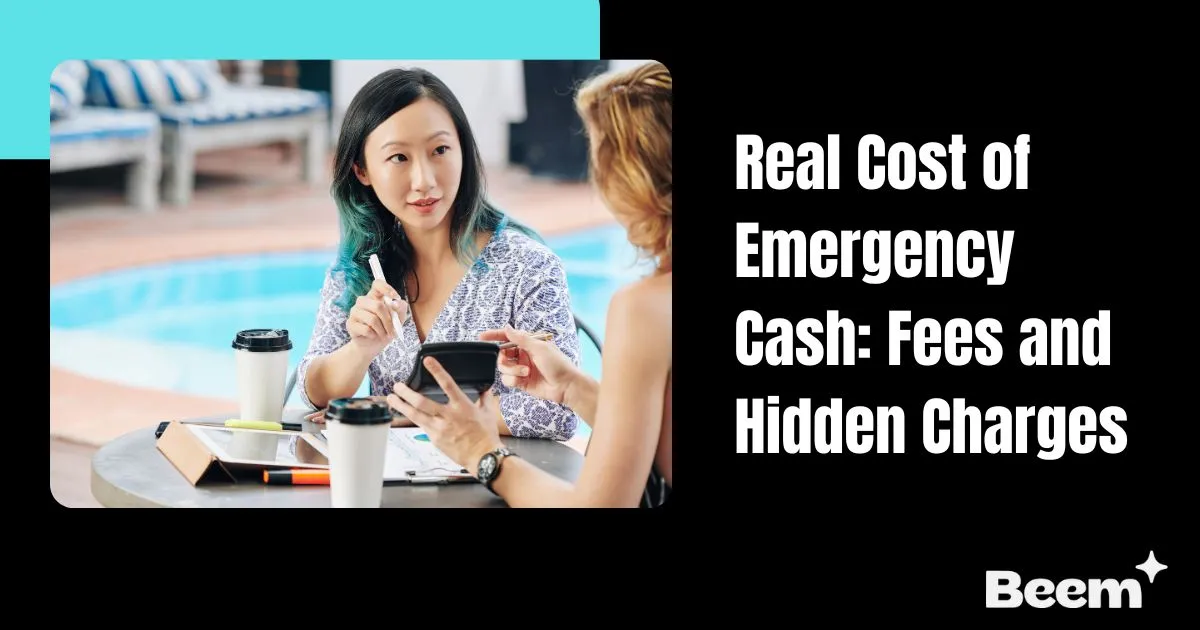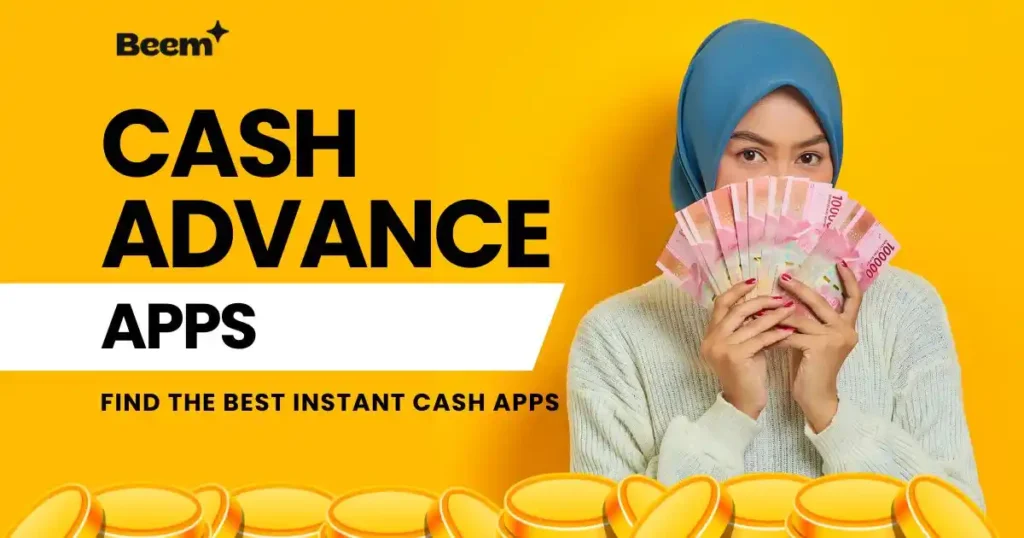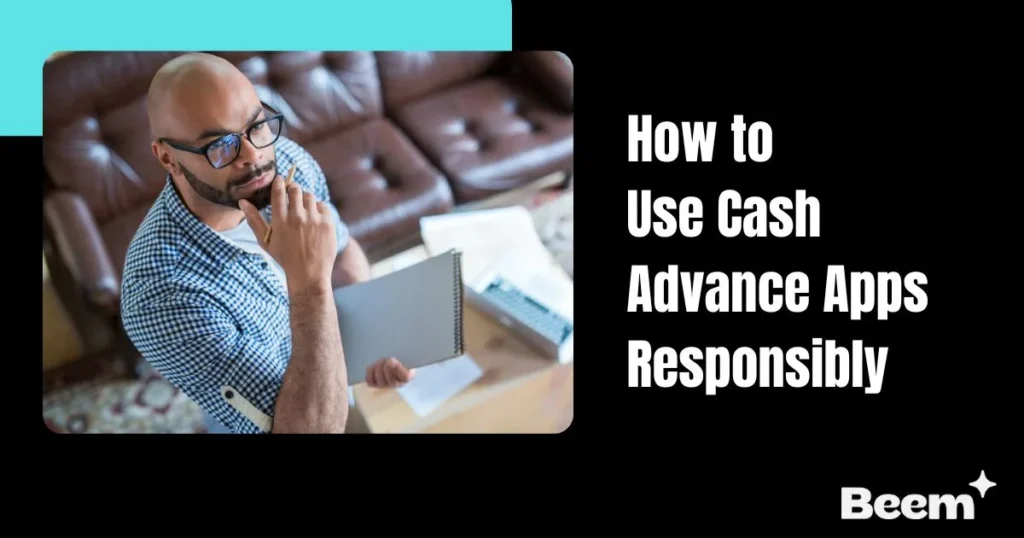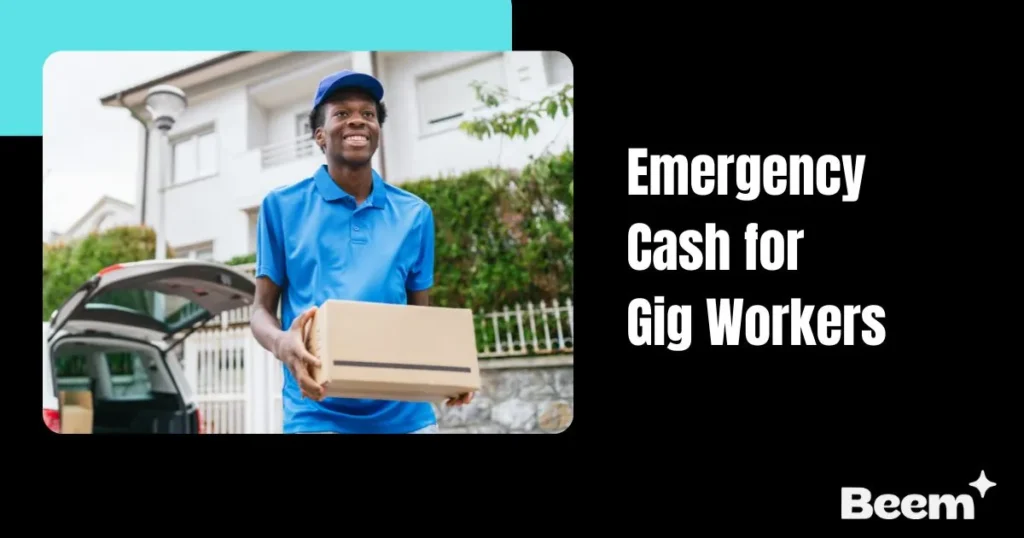At A Glance
When facing a financial emergency, it’s easy to reach for the fastest available cash. But in those moments, speed often comes at a price. The real cost of emergency cash can be steep, so being informed is your best bet.
Whether it’s payday loans, cash advance apps, or instant funding tools, emergency cash options can carry hidden fees, sky-high APRs, and vague repayment terms that trap you in long-term financial distress. This guide breaks down the real cost of emergency cash, explains where hidden charges appear, and shows how transparent solutions like Beem’s Everdraft™ offer safer alternatives.
Why Emergency Cash Comes at a Cost
Emergencies don’t come with a warning — and many Americans live paycheck to paycheck with little to no savings. When you urgently need $100–$500, most people are willing to accept almost any terms to get it. That’s where the danger lies.
The Problem:
- Traditional payday loans may offer fast cash but come with 300–700% APRs
- Many cash advance apps hide fees behind tipping systems, subscriptions, or accelerated transfer charges
- Rollover terms, unclear repayment dates, and forced overdrafts turn short-term help into long-term debt
In contrast, Beem offers emergency cash through Everdraft™ with:
- No interest
- No hidden fees
- No forced tipping
- Instant access and clear repayment
Understanding the Common Pricing Models
Let’s break down how various emergency cash services charge you:
Flat Fees
Many cash advance apps charge a flat fee — usually $5 to $20 per advance. While that seems small, it can quickly add up if you borrow weekly or biweekly.
- Borrowing $20 and paying $5 = 25% effective fee
- Borrowing $100 and paying $15 = 390% APR if repaid in 7 days
Tip-Based Models
Apps like Earnin use ‘pay what you think is fair’ models. But tipping is encouraged — sometimes even required for faster service or better access.
- Feels optional, but guilt-driven UX pushes tipping
- Some users pay $10+ tips for a $50 advance, unaware of the interest
Subscription Fees
Apps like Brigit or Dave charge monthly fees ($9.99–$19.99), regardless of how often you use the service.
- You may pay even if you never take an advance
- Subscription features may bundle services like budgeting or credit tools — but rarely justify the ongoing cost
APR and Interest-Based Products
Traditional payday and installment loans market themselves as “fast cash” solutions — but the interest is often crippling.
- Typical payday loan: $15–$20 fee per $100 borrowed
- Annualized, this translates to 300%–700% APR
- Installment loans may spread payments over weeks/months but often include origination fees, late penalties, and high interest
Also Read: Instant Cash Advance vs. Payday Loans

Hidden Charges to Watch Out For
Even if an app or lender advertises “low fees,” hidden costs can creep in through various mechanisms:
- Overdraft Fees: Some apps auto-debit your account on payday — even if funds aren’t available, leading to $35+ overdraft fees.
- Instant Transfer Fees: Need funds immediately? Many apps charge $2–$5 extra to send to your debit card instead of waiting 1–3 days for ACH.
- Rollover Fees: Some payday lenders roll your loan into a new one if unpaid, stacking fees with each cycle.
- Late Payment Charges: Missed your due date? Some services charge 10%+ penalties or block access to further funds.
- ‘Early Access’ Upcharges: Want to unlock more money or faster speed? You may need to upgrade your plan or tip more.
- Vague Repayment Schedules: Some apps don’t clarify when repayment will be deducted, risking accidental overdrafts.
Also Read: How to Avoid Predatory Lenders When You Need Emergency Cash
Short-Term vs. Long-Term Cost Impact
Let’s break down just how costly these small fees can become:
- Borrowing $200 for 7 days at a $15 flat fee = 391% APR
- Weekly borrowing with $10 fees = $520/year
- Hidden fees may create dependence, emotional stress, and worsen your long-term financial picture
Emotional and Financial Toll:
- Constant anxiety around repayment
- Bank balance monitoring becomes obsessive
- Savings plans and financial goals take a back seat
- Many users become reliant on cash apps for monthly budgeting
Beem’s Transparent Approach to Emergency Cash
Unlike apps that rely on tips or payday lenders that trap you with interest, Beem was designed to provide instant help without long-term harm.
What Makes Beem Different?
- No Interest or APR
- Flat, transparent fee — clearly disclosed before you borrow
- No subscriptions or forced memberships
- No overdraft risks — smart withdrawal timing
- No tipping pressure
- Instant cash access via Everdraft™
- Extra tools:
- High-Yield Savings Account (HYSA) access
- Budgeting insights
- Credit-building card integration
How to Evaluate True Cost Before You Borrow
Before accepting emergency funds from any provider, run through this checklist:
- Is the fee structure published and easy to understand?
- Is there a clear total cost summary (not just weekly fees)?
- Do reviews mention hidden fees or overdrafts?
- Does the service encourage tipping or upselling?
- Is the repayment date confirmed and flexible?
- Does the provider offer financial education or planning tools?
Consider using APR calculators to compare offers — what seems like a small one-time fee can often be equivalent to a whole lot in annual interest.
Also Read: How To Spot A Legitimate Cash Advance App
Frequently Asked Questions About The Real Cost of Emergency Cash
What is the average cost of emergency cash advances?
Most cash advance apps charge a flat fee between $10 and $50 per advance. However, when calculated as an annual percentage rate (APR), especially with frequent borrowing, these fees can exceed 300%. Some platforms also add tipping, subscription charges, or express transfer fees. Always review the total cost before accepting a payout.
Are tip-based cash apps really free?
Not exactly. While tipping is technically optional, these apps often nudge you to tip higher, using guilt-based messaging. If you choose not to tip, you may face slower transfers or limited features. Over time, these small tips can add up, making the service far from free in practice. Always check how tipping affects access.
Why do payday loans charge such high interest?
Payday loans are high-risk, short-term financial products, often operating in loosely regulated environments. Lenders make most of their profits from repeat borrowers stuck in rollover cycles. Interest rates typically range from 300% to 700% APR. These predatory terms are rarely about helping consumers — and more about maximizing lender profit.
Is there an emergency cash option with no interest?
Beem’s Everdraft™ provides emergency cash with no interest and no credit check. Instead of traditional lending models, Beem uses your bank and income activity to offer responsible, flat-fee access. It’s a safe, upfront option that doesn’t profit off your financial distress. You know exactly what you’re paying every time.
Do cash advance apps charge overdraft fees?
Some apps auto-debit your account on payday without checking if you have enough funds, which can trigger overdraft fees. Beem avoids this by using smart repayment timing and ensuring users are never overdrawn due to an advance. Always choose apps that respect your balance and provide repayment flexibility.
Are subscription-based cash apps worth it?
That depends on usage. If you only need an advance occasionally, paying $10–$20/month can be wasteful. Many users pay $120–$240 per year for benefits they rarely use. Beem offers pay-per-use pricing, making it better for users who want flexible access without long-term financial commitments or hidden subscriptions.
What’s the most affordable way to get emergency cash?
Some of the safest, low-cost alternatives include Beem’s Everdraft™ with its flat, transparent fees, credit union PALs (Payday Alternative Loans), and employer paycheck advances that offer better terms than payday loans, tipping models, or subscription-based cash apps, which often cost more over time.
Can I get charged just for transferring money instantly?
Yes. Many apps charge a $2–$5 express fee if you want funds sent immediately to a debit card. Free options usually involve a 1–3 business day wait. Beem always discloses any applicable transfer fees upfront, so you’re never surprised by unexpected charges at payout time.
How can I avoid hidden charges altogether?
Choose fully transparent platforms. Beem publishes its complete fee structure and avoids confusing UX tricks or upselling. It doesn’t rely on tipping models, subscriptions, or buried terms. Before signing up, read app reviews and fee disclosures to protect your finances.
Is Beem more affordable than other cash advance apps?
Yes. Beem uses a flat-fee, no-interest model that avoids subscriptions, tipping pressure, and hidden costs. You only pay when you use it — no monthly charges or feature lockouts. For users seeking emergency cash that’s fair, fast, and transparent, Beem stands out as one of the most cost-effective solutions available.
Conclusion: Pay Attention to the Price of ‘Fast’
In a financial emergency, reaching for any solution that promises speed and simplicity is tempting. But the real cost of emergency cash can be steep — in money, stress, and long-term financial health. From $5 tips to $50 rollover fees and 700% APR payday loans, emergency cash is rarely free. What matters is transparency and fairness.
This is why with guarantees like instant emergency funds, no subscriptions, no interest, upfront pricing, no overdraft traps, and built-in tools to help you budget, save, and grow, Beem’s Everdraft™ shines.
If you found this post helpful, try Beem for more tips on personal finance, budgeting, and other money matters. Download the Beem app here.






